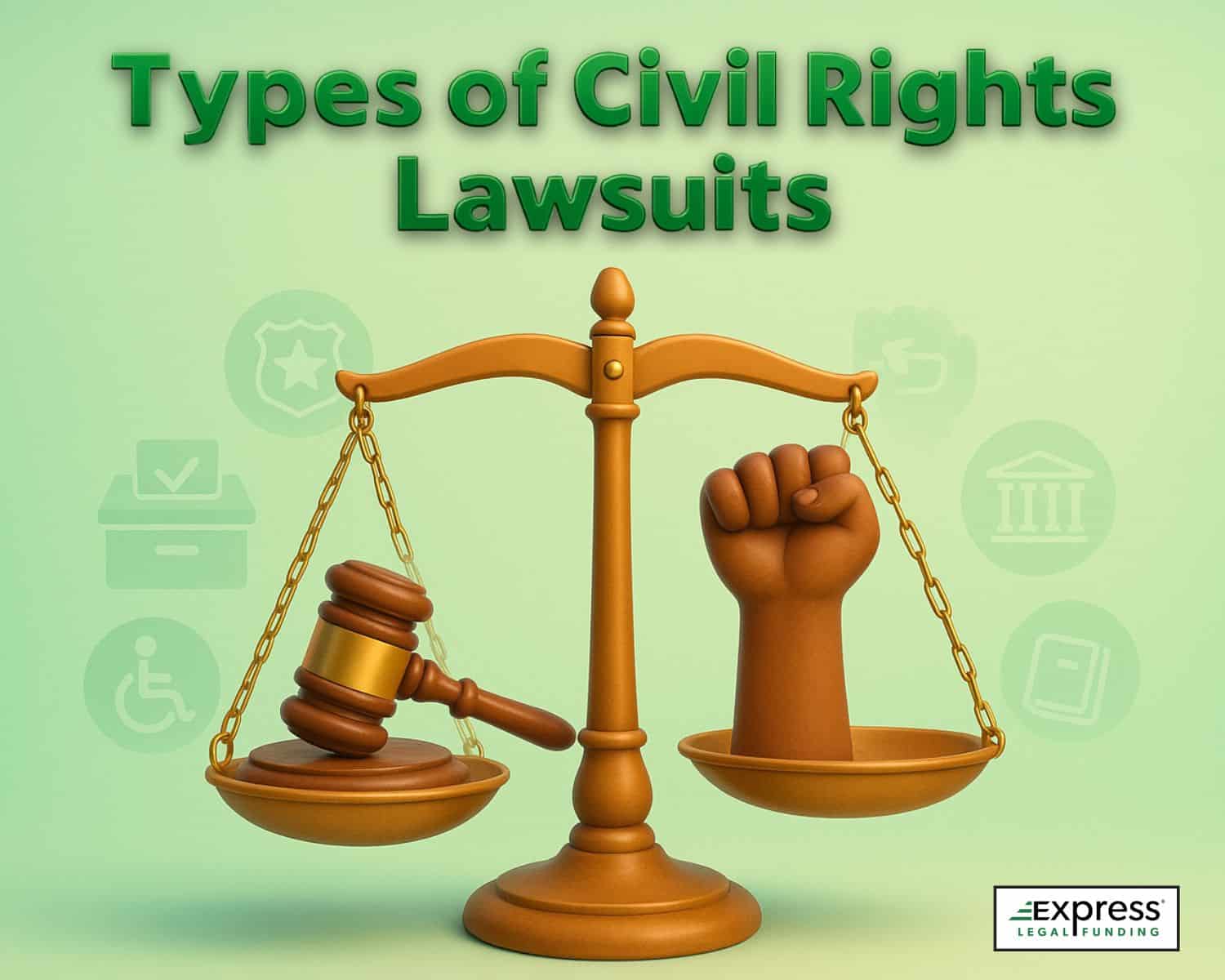
Have you been treated unfairly and wondered, “Is this actually illegal?”
If an employer, public official, landlord, school, or law enforcement officer crossed the line and violated your legally protected civil rights, you may be able to do more than just complain — you can take legal action.
Civil rights lawsuits aren’t just about money. They’re about forcing change, holding the wrongdoer accountable, and protecting others from going through what you went through. These cases are grounded in both federal and state laws, with the United States Constitution setting the foundation and additional statutes adding more protections.
Here are 12 common types of civil rights lawsuits, the laws that apply, and what steps might be involved if you’re thinking of taking action.
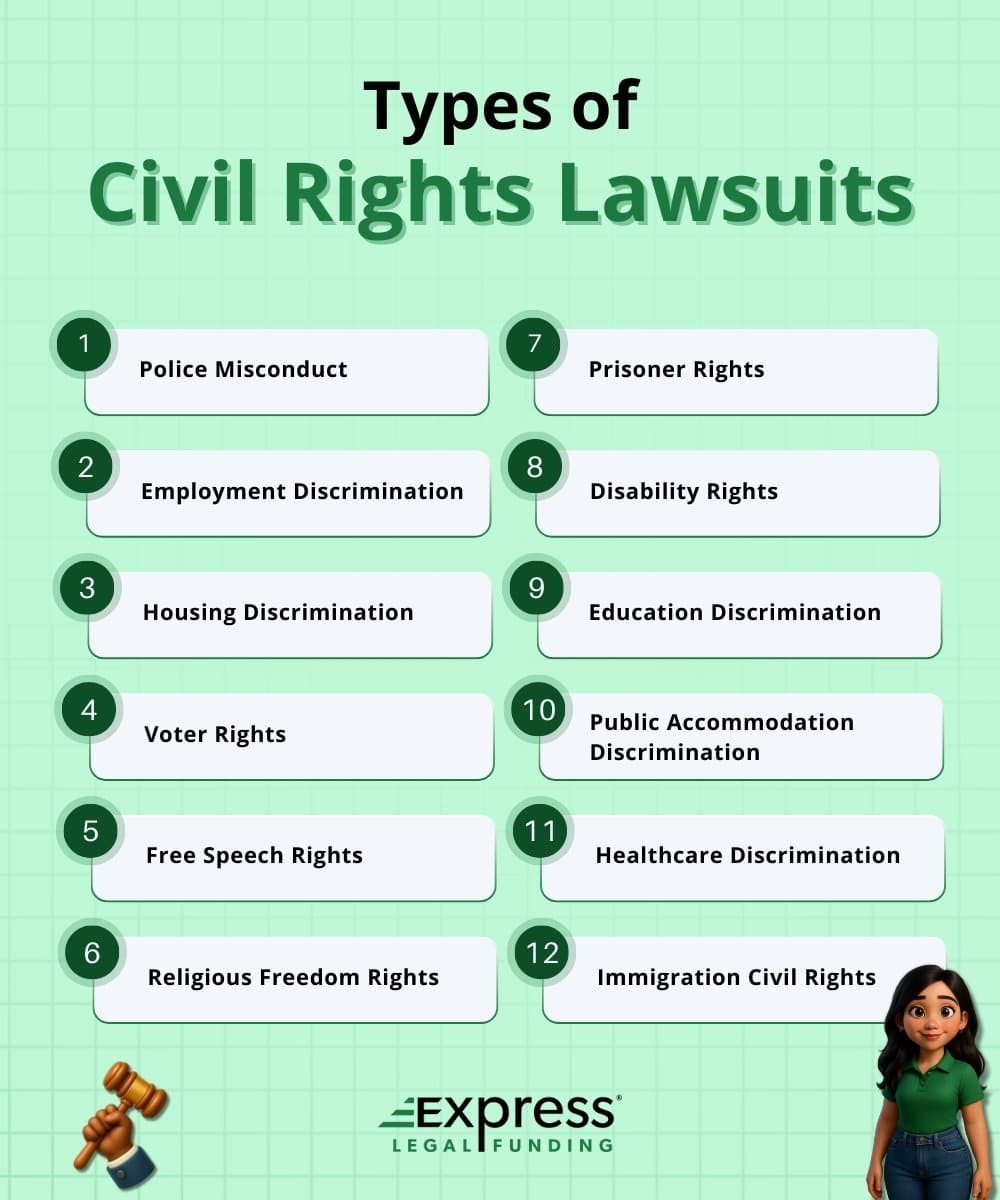
12 Common Types of Civil Rights Lawsuits
- Police Misconduct and Excessive Force Lawsuits
- Employment Discrimination Lawsuits
- Housing Discrimination Lawsuits
- Voter Rights Lawsuits
- Free Speech Rights Lawsuits
- Religious Freedom Lawsuits
- Prisoner Rights Lawsuits
- Disability Rights Lawsuits
- Education Discrimination Lawsuits
- Public Accommodation Discrimination Lawsuits
- Healthcare Discrimination Lawsuits
- Immigration-Related Civil Rights Lawsuits
1. Police Misconduct and Excessive Force Lawsuits
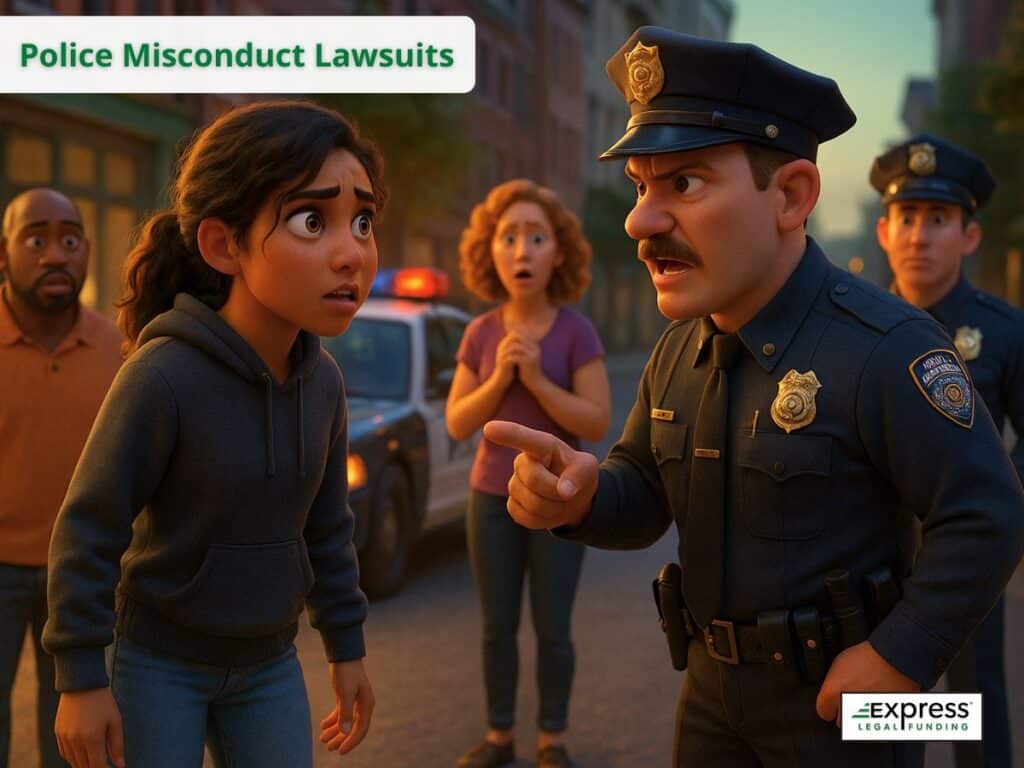
If you were thrown to the ground, hit, tasered, or detained without legitimate cause, you probably felt powerless in that moment. But under 42 U.S.C. § 1983, you may be able to sue the police officer — and sometimes their department — for violating your constitutional rights while acting in their official role.
Excessive force claims often involve the Fourth Amendment, which protects you from unreasonable seizures. In Graham v. Connor, the U.S. Supreme Court said force must be “objectively reasonable,” meaning a reasonable officer in that situation wouldn’t have acted the same way.
Common Examples:
- Unlawful shootings
- Physical abuse during arrest
- Striking or tasering a subdued suspect
- Prolonged detention without probable cause
Defenses you should know: Officers often invoke qualified immunity, which can block your case if the right they violated wasn’t “clearly established” in prior cases.
Remedies: Successful police misconduct claims can lead to significant financial compensation, with settlements and court awards often reaching millions of dollars.
Filing timelines:
- Usually matches your state’s personal injury statute of limitations (about 2–3 years)
- Some states and local jurisdictions require a notice of claim within 60–180 days for suits against cities or counties
2. Employment Discrimination Lawsuits
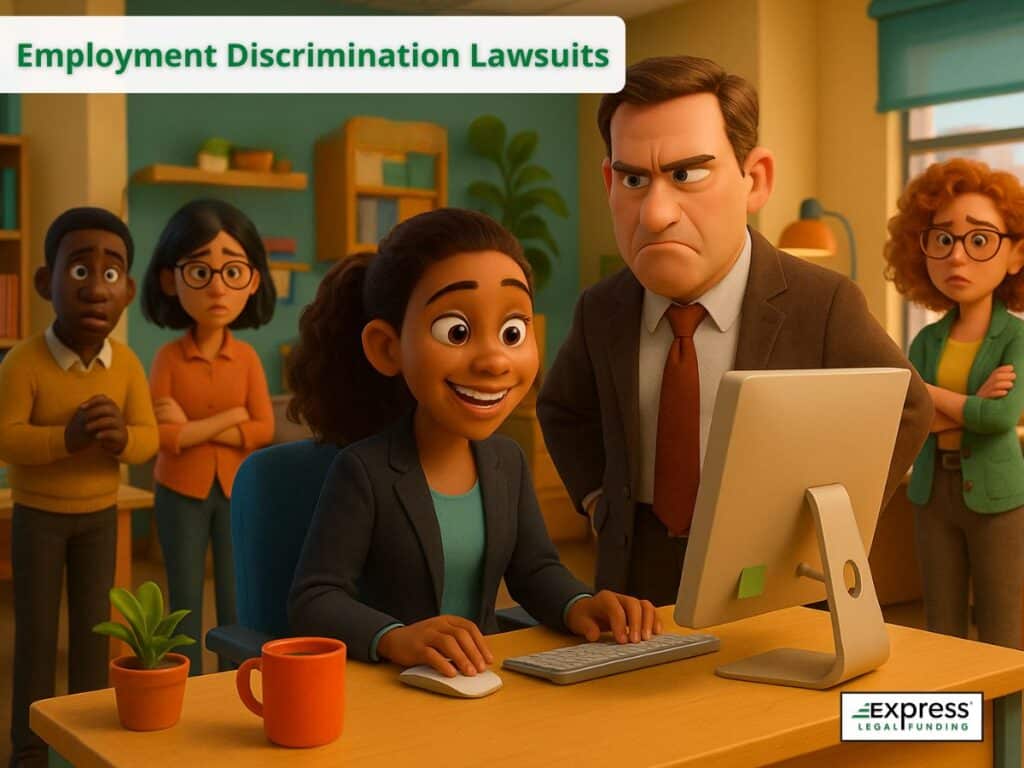
If you were passed over for a promotion, fired after disclosing a pregnancy, or ignored when you asked for a reasonable accommodation, this could be more than bad workplace politics — it could be illegal employment discrimination.
Federal protections through Title VII, the ADA (Americans with Disabilities Act), and the ADEA (Age Discrimination in Employment Act) make it illegal for employers to take negative actions against you because of your race, religion, sex (including sexual orientation and gender identity), disability, or age (40+).
These laws are enforced by the Equal Employment Opportunity Commission (EEOC), which investigates complaints, makes findings, and usually must review your claim before you’re allowed to file a lawsuit in court.
Common Examples:
- Being fired because you reported sexual harassment
- Denial of promotion due to race or pregnancy
- Refusal to make reasonable accommodations for disabilities
Extra protections: In California and New York, laws also cover marital status, political affiliation, or caregiving responsibilities.
Defenses you should know: Employers may claim decisions were based on legitimate business reasons, performance issues, or that accommodations would cause undue hardship.
Remedies: Successful claims can result in back pay, reinstatement, compensatory and punitive damages, front pay, and attorney’s fees.
Procedural notes: You usually can’t go straight to court — an EEOC complaint must be filed first, and there are strict deadlines: 180 days in most cases, 300 if your state has its own agency.
State-Specific Employment Discrimination Protections
- New York: The state Human Rights Law applies to all employers, not just those with 15+ employees, as required under federal Title VII.
- Texas: Follows federal law but requires a Notice of Claim before suing a government entity, which can shorten filing deadlines.
3. Housing Discrimination Lawsuits
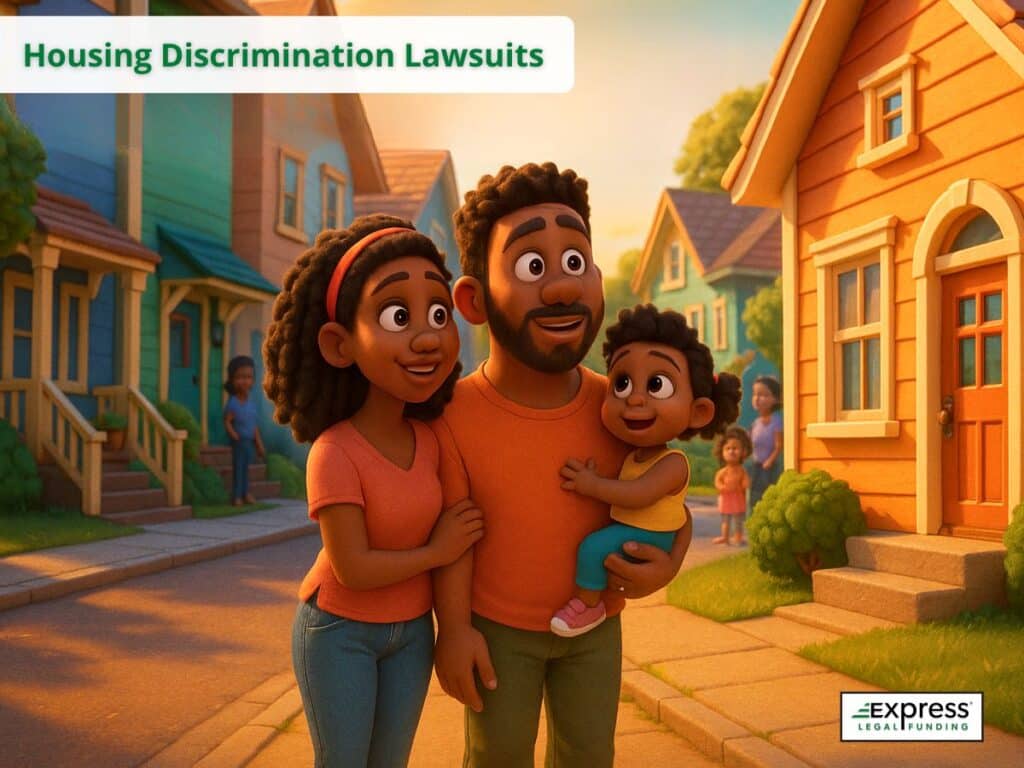
Being told “the apartment’s no longer available” right after the landlord meets you, or being steered toward certain neighborhoods, may be housing discrimination. The Fair Housing Act makes this illegal.
The U.S. Department of Housing and Urban Development (HUD) enforces the Fair Housing Act. It investigates complaints, helps resolve disputes through mediation, and can refer serious cases to the Department of Justice (DOJ).
Common Examples:
- Refusing to rent to a tenant with children
- Steering buyers of color to certain neighborhoods
- Denying a mortgage based on ethnicity
Defenses you should know: Landlords may argue legitimate tenant-screening criteria, exemptions (like small owner-occupied buildings), or lack of discriminatory intent.
Remedies: Courts can award damages, issue injunctions, and allow attorneys’ fees. HUD may also mediate or refer cases to the DOJ.
Relevant read: How Much Can I Sue My Landlord for Emotional Distress?
Procedural note: You can file a complaint with HUD within one year. They can investigate, mediate, or refer to the DOJ. You can also take your case to a United States federal court, sometimes alongside state law claims.
State differences: Some states protect additional traits like source of income or veteran status. These include:
State-Specific Housing Protections
- California: Adds source of income and immigration status as protected categories. Section 8 vouchers must be accepted
- New York: Protects lawful occupation and military status; allows monetary damages. The NYC Fair Chance Act prohibits landlords from denying tenants based on prior arrest records.
- Texas: Relies mostly on federal law, but cities like Austin and Dallas extend protections to LGBTQ+ status.
Relevant read: Tenant Rights Violations: 10 Reasons to Sue Your Landlord
4. Voter Rights Lawsuits
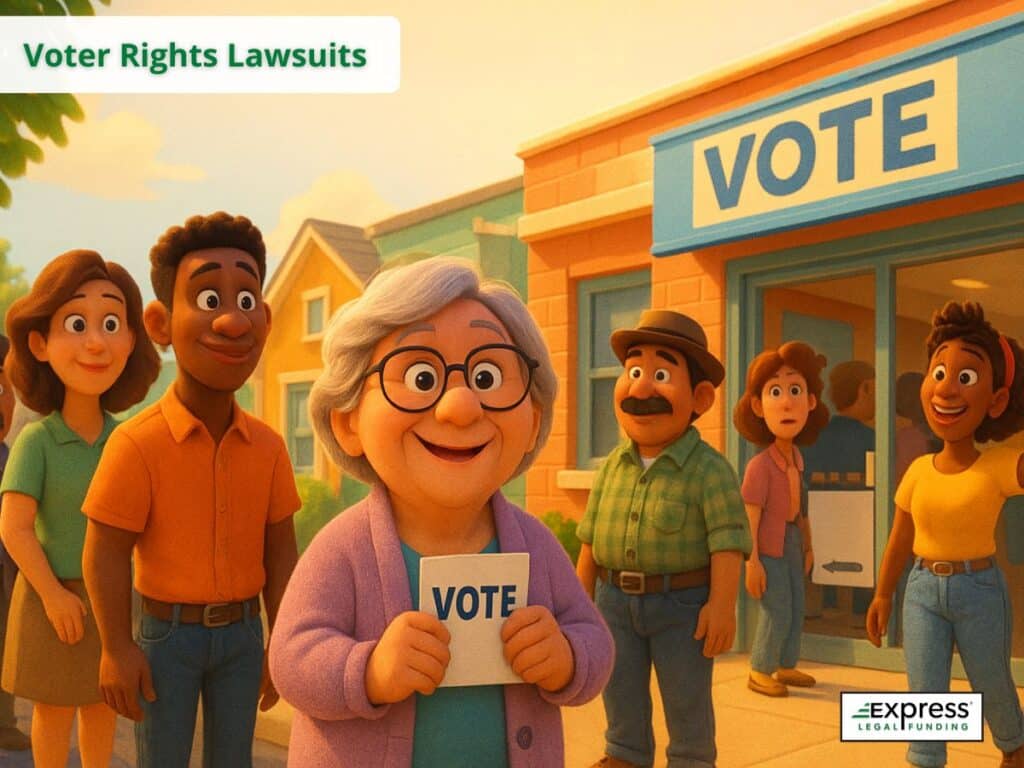
If someone made it harder for you to vote — moving your polling location without notice, imposing extra ID requirements that target your community, or purging your name from the rolls without reason — you may have a voter rights claim.
These cases often rely on the Voting Rights Act of 1965, along with the Fourteenth and Fifteenth Amendments, and the Equal Protection Clause, which requires voting rules to be applied fairly across groups.
Courts look at whether a rule was intended to discriminate or whether it has a discriminatory effect, even if the wording seems neutral.
Because elections happen quickly, timing is critical — many lawsuits ask for emergency court orders before ballots are cast.
Common Examples:
- Closing polling places in minority neighborhoods
- Requiring unusual documentation aimed at certain groups
- Gerrymandering that weakens minority voting power
Defenses you should know: Election officials often argue the law was applied equally to everyone, that there was no intent to discriminate, or that a voter can’t prove personal harm (standing).
Remedies: Courts may block discriminatory practices, reopen polling sites, extend voting hours, or restore names to the rolls. Successful plaintiffs can sometimes recover attorney’s fees.
Procedural notes: These suits often seek emergency injunctions before elections, making timing crucial.
State-Specific Voting Rights Protections
- Arizona: Federal courts use the Brnovich v. DNC test when reviewing Section 2 Voting Rights Act claims, making it harder to win without clear evidence of discriminatory effects.
- California: Allows same-day voter registration at polling places, reducing the risk of wrongful voter roll purges and other suppression tactics.
- North Carolina: Courts have repeatedly struck down voter ID laws found to disproportionately impact Black voters.
5. Free Speech Rights Lawsuits
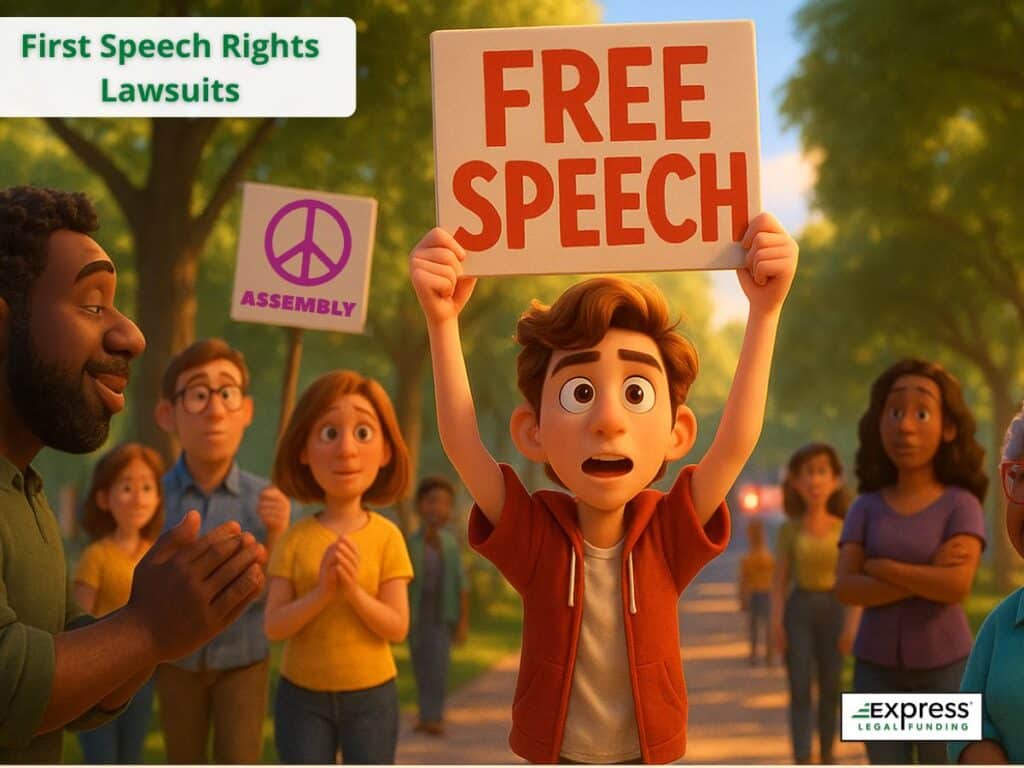
If you’ve been arrested for peaceful protesting, told you can’t hand out flyers in a public park, or fired from your public-sector job for speaking out, your free speech rights may have been trampled.
These rights are protected by the First Amendment of the U.S. Constitution and include freedom of speech, press, religion, and peaceful assembly — but they mostly apply to government interference. Private actions usually don’t count unless the private actor is treated as a “state actor.”
Common Examples:
- Arresting peaceful protesters
- Censoring public art because of its message
- Retaliating against a government employee for whistleblowing
Defenses you should know: Government officials often argue qualified immunity, or that restrictions were reasonable “time, place, and manner” limits applied neutrally. Public employees face an additional hurdle under the Pickering test, which weighs their speech rights against the employer’s interest in efficient services.
Remedies: Courts can issue injunctions restoring free speech rights, reinstate a wrongfully terminated public employee, or award damages for harm caused. Prevailing plaintiffs may also recover attorney’s fees.
Procedural notes: First Amendment claims are usually filed under 42 U.S.C. § 1983 within the state’s personal injury statute of limitations (typically 2–3 years). State constitutions may also provide parallel protections in state courts.
State-Specific First-Amendment Protections
- California: The state constitution protects free speech more broadly, requiring shopping centers to allow peaceful political activity (Pruneyard Shopping Center v. Robins).
- New York: Labor law protects employees’ lawful off-duty conduct, including political expression, beyond federal protections.
- Texas: Passed laws limiting social media moderation of political speech; ongoing court battles test First Amendment boundaries.
6. Religious Freedom Lawsuits
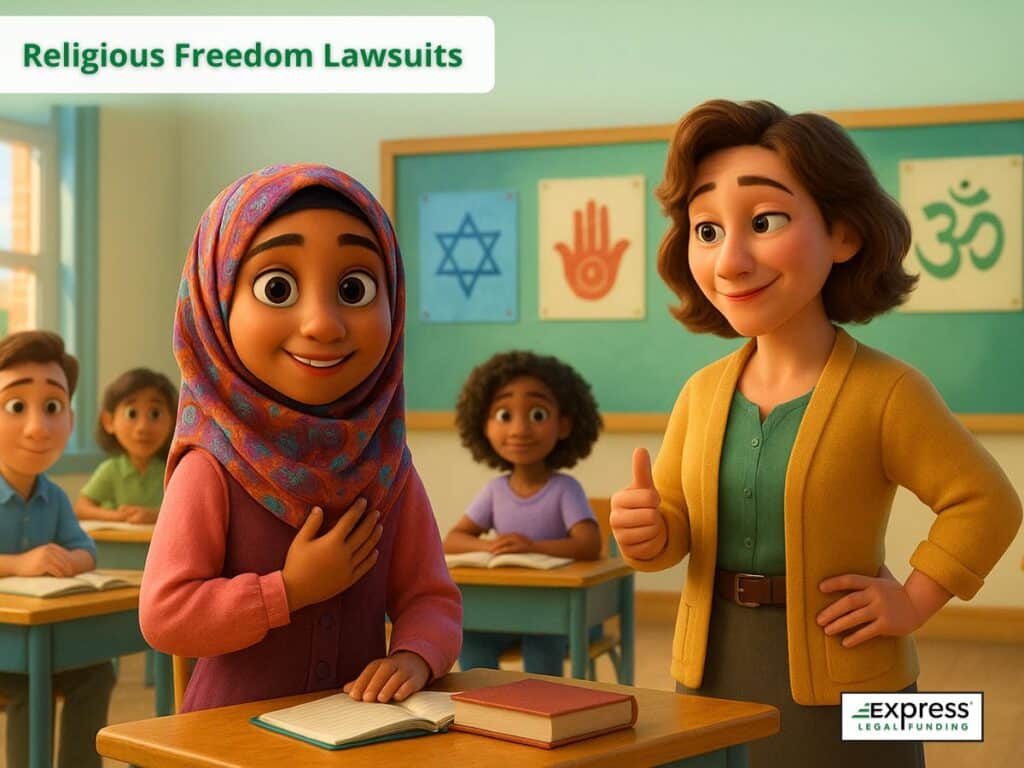
If your ability to practice your religion has been restricted by a government body, school, or employer, you may have a religious freedom claim. These lawsuits often rely on the First Amendment, the Religious Freedom Restoration Act (RFRA), or the Religious Land Use and Institutionalized Persons Act (RLUIPA).
Common Examples:
- Public schools banning religious clothing or expression without a valid reason
- Employers denying reasonable accommodations for Sabbath observance or prayer breaks
- Zoning laws blocking the construction of a place of worship while allowing similar secular buildings
- Prison policies preventing inmates from following religious dietary rules or observances
Defenses you should know: Defendants may argue that their actions were neutral and generally applicable, or that the restriction served a compelling governmental interest applied in the least restrictive way.
Remedies: Courts can order the resumption of religious practices, modify discriminatory policies, and award damages in certain situations. Under RFRA and RLUIPA, prevailing plaintiffs may also recover attorneys’ fees.
Procedural notes: Deadlines vary by statute, but First Amendment § 1983 claims generally follow the state’s personal injury statute of limitations (2–3 years in most states). Some cases require exhausting administrative remedies first.
State-Specific Religious Protections:
- California: Strong protections under the state constitution and FEHA, plus zoning safeguards for religious institutions.
- New York: Human Rights Law prohibits religious discrimination in employment, housing, and public accommodations.
- Texas: State RFRA provides broader protections than federal law, requiring courts to apply “strict scrutiny” to any government action burdening religion.
7. Prisoner Rights Lawsuits
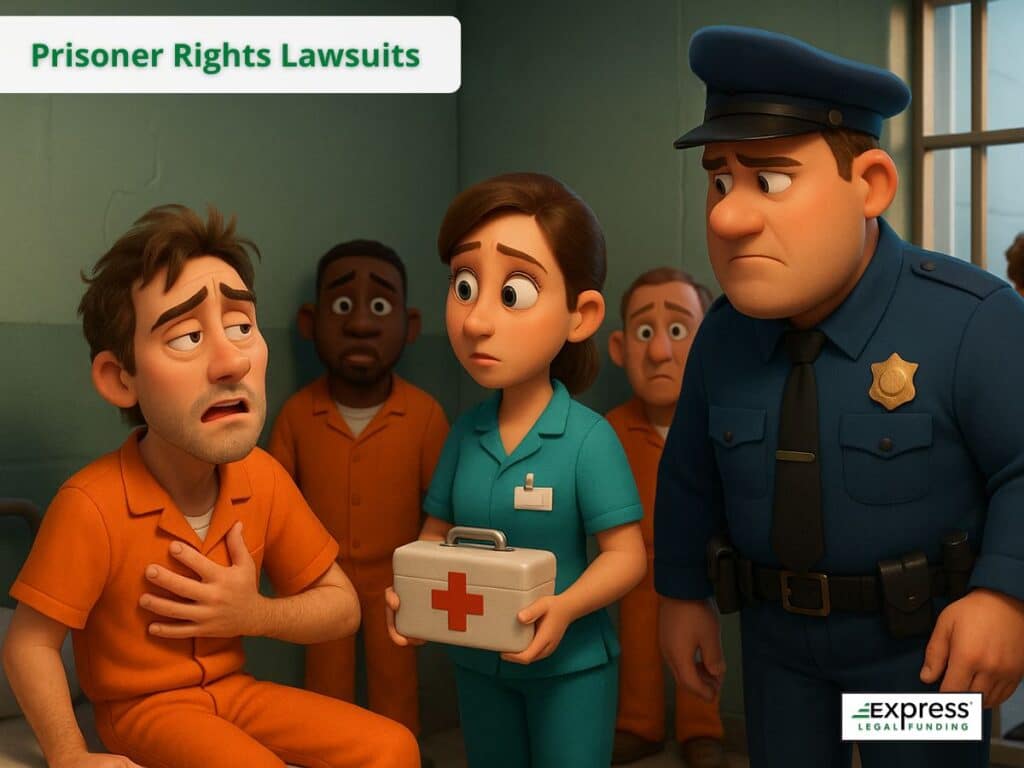
Being behind bars doesn’t strip away your right to humane treatment. If you were denied necessary medical care, exposed to dangerous conditions, or placed in solitary confinement without justification, you may be able to file a prisoner rights lawsuit under the Eighth Amendment.
These claims don’t just cover physical abuse — they also include systemic issues like overcrowding, inadequate mental health services, and failure to protect inmates from violence.
Courts have repeatedly held that prisons must provide “the minimal civilized measure of life’s necessities,” and falling short of that can create liability.
Common Examples:
- Denying treatment for serious medical conditions
- Keeping inmates in dangerous or degrading conditions
- Overuse of solitary confinement without cause
Defenses you should know: Prisons may argue that officials weren’t deliberately indifferent or that the inmate failed to exhaust administrative grievance remedies, as required by the Prison Litigation Reform Act (PLRA).
Remedies: Courts may order improved conditions, provide medical care, or award damages for proven harm.
Procedural notes: The PLRA requires that you first use the prison’s grievance process before heading to court.
State-Specific Prisoner Rights Protections
- California: State law requires prisons to provide healthcare that meets constitutional standards, and courts have overseen reforms through consent decrees in cases like Brown v. Plata, which forced California to reduce prison overcrowding.
- Illinois: Courts have ruled that denial of mental health care in state prisons violates both federal and state constitutions, expanding liability beyond the Eighth Amendment.
- New York: State courts have allowed prisoner claims for violations of state constitutional rights, even when federal claims are barred by qualified immunity.
- Texas: Inmate lawsuits face stricter hurdles due to the state’s inmate grievance system, which imposes procedural requirements that inmates must exhaust before filing a lawsuit.
8. Disability Rights Lawsuits
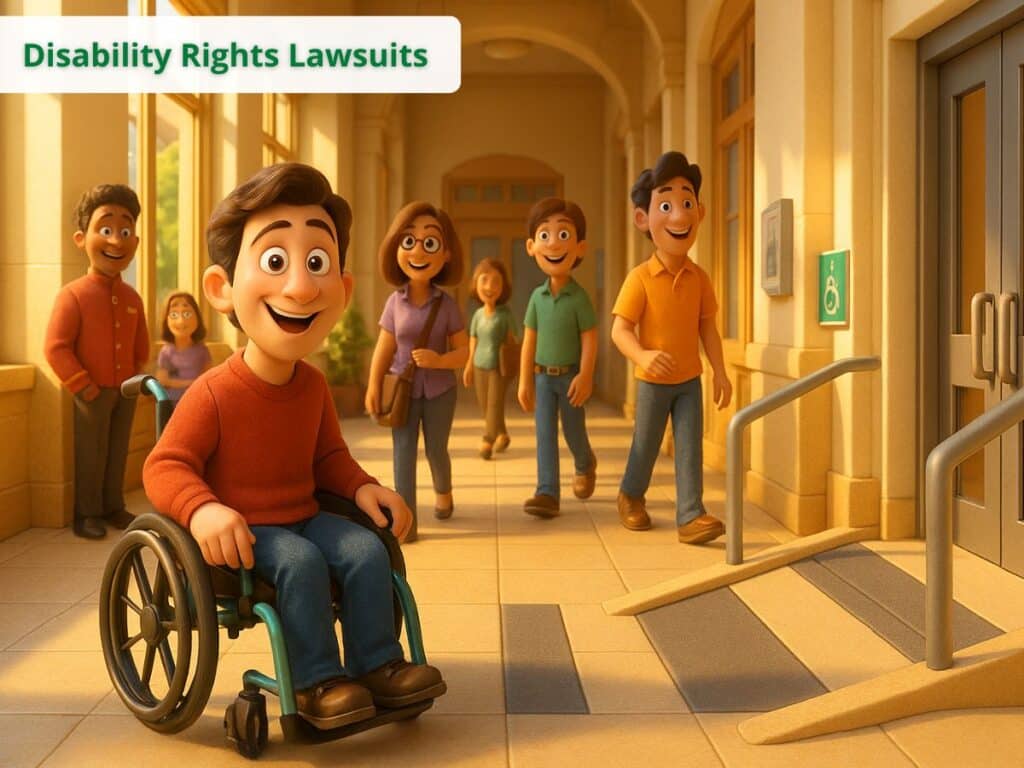
If a building’s front steps keep you from entering, a school denies classroom accommodations, or an employer refuses flexible scheduling despite your medical needs, these can all be violations of the ADA and Section 504.
Some states make it easier to bring claims by defining “disability” more broadly than the federal standard.
Common Examples:
- Lack of wheelchair access in a public facility
- Employer refusing to adjust job duties for documented needs
- School ignoring accommodation requests for a child with ADHD
Defenses you should know: Defendants may argue that accommodations were unreasonable, posed undue hardship, or that the plaintiff doesn’t meet the legal definition of “disabled.”
Remedies: Courts can order accessibility modifications, award damages, and enforce policy changes.
State-Specific Disability Rights Protections
- California: The Unruh Civil Rights Act goes beyond the ADA, extending disability protections and allowing damages in cases where federal law only mandates access changes.
- Massachusetts: State law allows private plaintiffs to recover attorney’s fees and damages for disability discrimination, providing broader incentives to sue than the ADA alone.
- New York: Courts have interpreted disability protections broadly, making it easier for plaintiffs to prove they qualify as “disabled” under state law compared to the federal definition.
- Texas: While following the ADA, Texas courts have been less expansive in defining disability, but cities like Austin impose stricter accessibility requirements in building codes.
9. Education Discrimination Lawsuits
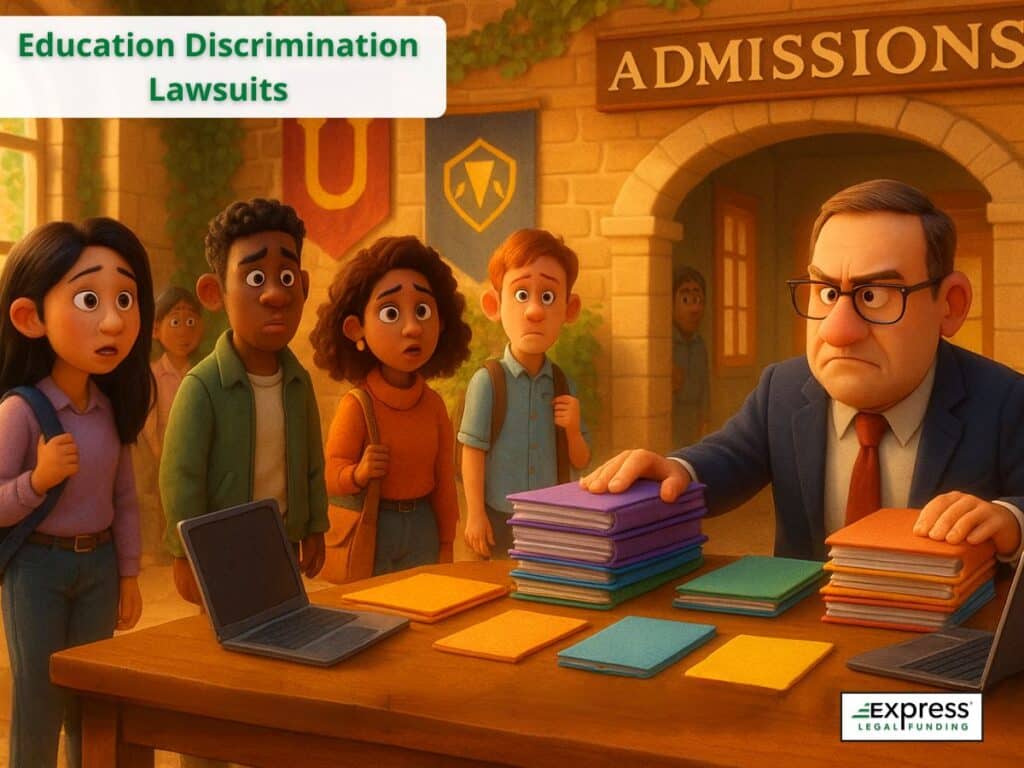
If your child was harassed at school based on sex, denied special education services, or placed in a less challenging program because of assumptions about their race or disability, you may have a claim.
Federal laws like Title IX and IDEA prohibit discrimination based on sex or disability in education. Public school cases may also invoke the Equal Protection Clause, particularly when alleging discriminatory treatment by state actors.
Common Examples:
- Denial of college admission based on race or religion
- Sexual harassment by school staff or other students
- Denial of services promised in an individualized education program (IEP)
Defenses you should know: Schools may argue they followed procedures, provided reasonable services, or that misconduct wasn’t severe or pervasive.
Remedies: Remedies include revised IEP services, damages in some Title IX cases, and injunctions requiring equal treatment.
Procedural notes: Title IX claims go through the school grievance process first; IDEA requires a due process hearing before you file suit.
State-Specific Education Discrimination Protections
- Florida: Has faced lawsuits over discrimination in ESOL programs, with courts finding some school districts failed to provide adequate resources for non-English-speaking students.
- California: State education law requires additional anti-discrimination protections, including safeguards against bias in special education placement.
- New York: The Dignity for All Students Act prohibits bullying and harassment in schools based on traits like sexual orientation, gender identity, and disability — going further than federal law.
10. Public Accommodation Discrimination Lawsuits
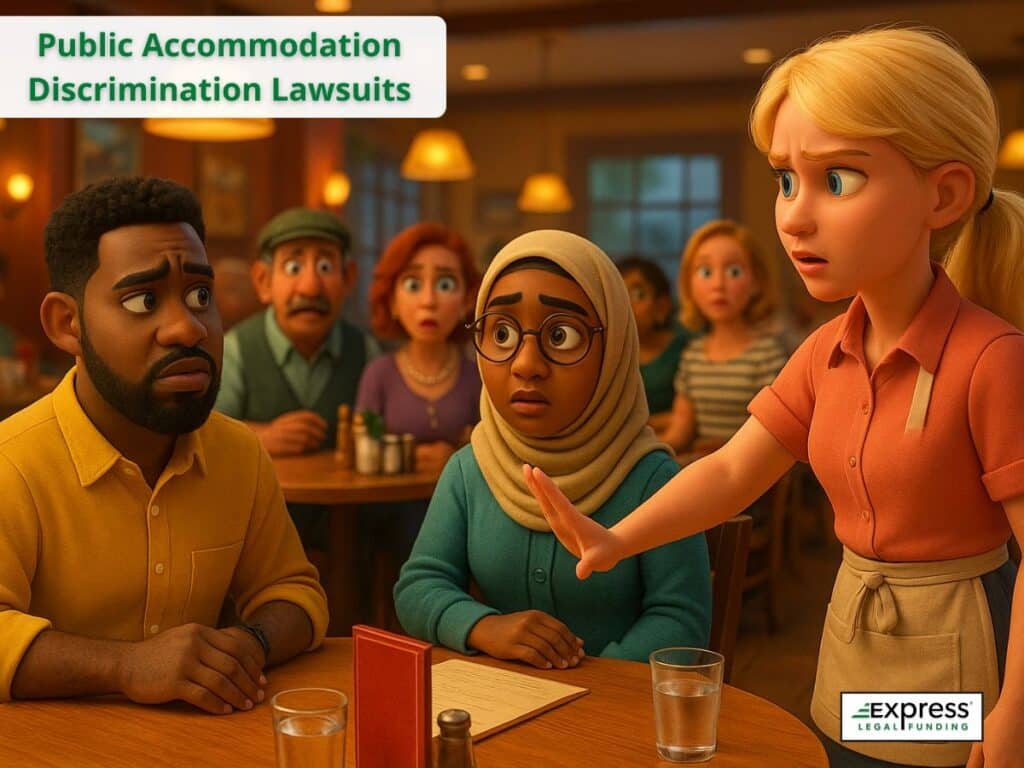
If you were refused service in a restaurant, charged a higher price because of your religion, or told to leave a public business because of your race, you may have a public accommodation discrimination claim. Title II of the Civil Rights Act of 1964 prohibits discrimination in places open to the public, though it mainly provides injunctive relief to stop the unlawful practice.
Common Examples:
- Refusing service because of race
- Denying hotel rooms based on national origin
- Charging different prices based on religion
Defenses you should know: Businesses may argue they aren’t covered as a “public accommodation” under the law, or that they applied neutral rules, like safety standards or dress codes, equally to all customers.
Remedies: Federal law allows injunctions requiring equal access, while many state laws go further, permitting damages, attorney’s fees, and broader protections that include sexual orientation, gender identity, or disability.
Procedural notes: State human rights commissions often accept administrative complaints within one year.
State-Specific Public Accommodation Protections
- California: The Unruh Civil Rights Act applies to all business establishments, including restaurants, hotels, and medical providers. Unlike federal law, it allows monetary damages.
- New York: The Human Rights Law prohibits discrimination in public accommodations and adds protections for traits like military status and marital status. It also allows recovery of damages and attorney’s fees.
- Texas: State law is narrower, but cities like Austin and Dallas have local ordinances that ban discrimination based on sexual orientation and gender identity in businesses open to the public.
11. Healthcare Discrimination Lawsuits
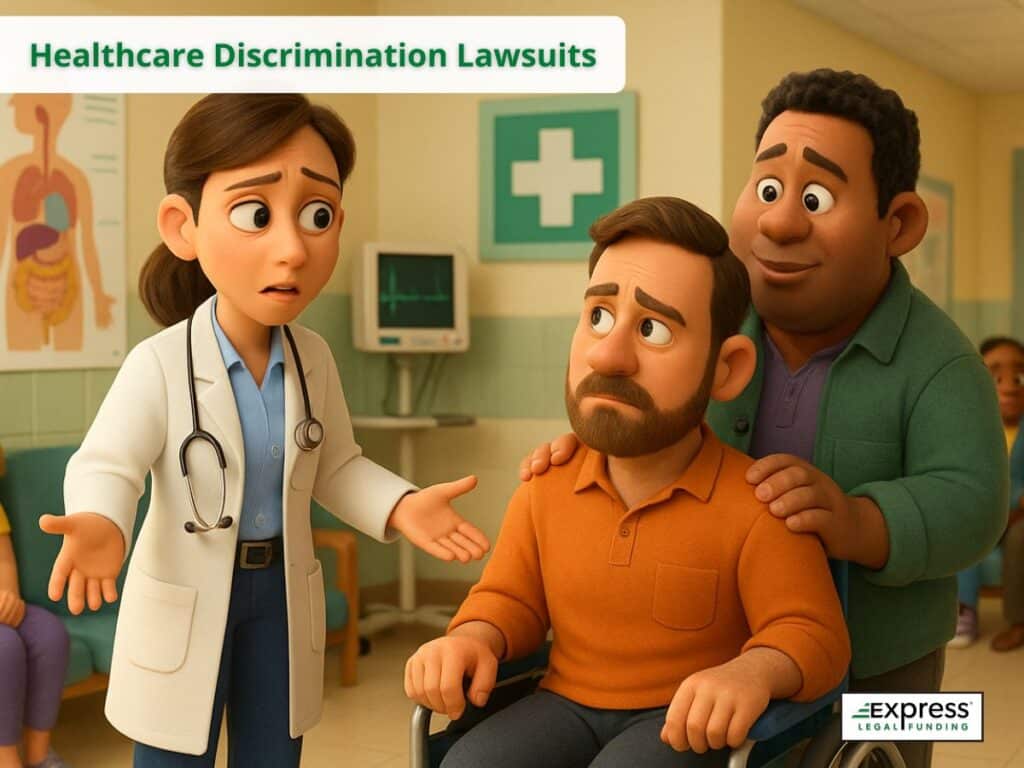
If you were denied treatment, given substandard care, or faced unequal medical access due to your race, gender, disability, religion, or sexual orientation, you may be the victim of healthcare discrimination.
Federal protections include Title VI of the Civil Rights Act, ADA, and Section 1557 of the Affordable Care Act, which prohibits discrimination in health programs receiving federal funding.
Common Examples:
- A hospital refusing to treat a patient because of gender identity or sexual orientation
- A doctor giving different treatment based on assumptions about a patient’s race or ethnicity
- Unequal pain management for women or minorities compared to other patients
- Refusal to provide interpreters or accessible facilities for patients with disabilities
Defenses you should know: Healthcare providers may argue that treatment differences were based on medical necessity, not discrimination, or claim a lack of intent to discriminate.
Remedies: Courts can require policy changes, order equal access to medical services, and award damages for harm caused.
Procedural notes: Complaints to HHS’s Office for Civil Rights generally must be filed within 180 days of the alleged discrimination. You can also go to court directly in some cases, depending on the statute involved.
State-Specific Healthcare Rights Protections:
- California: Broad protections under the Unruh Civil Rights Act forbid discrimination by “all business establishments,” including healthcare providers, and allow damages.
- New York: Public Health Law prohibits discrimination in all hospitals and clinics, with the Attorney General empowered to act.
- Texas: Relies heavily on federal law, but certain cities have local ordinances adding protections for LGBTQ+ individuals in healthcare settings.
12. Immigration‑Related Civil Rights Lawsuits
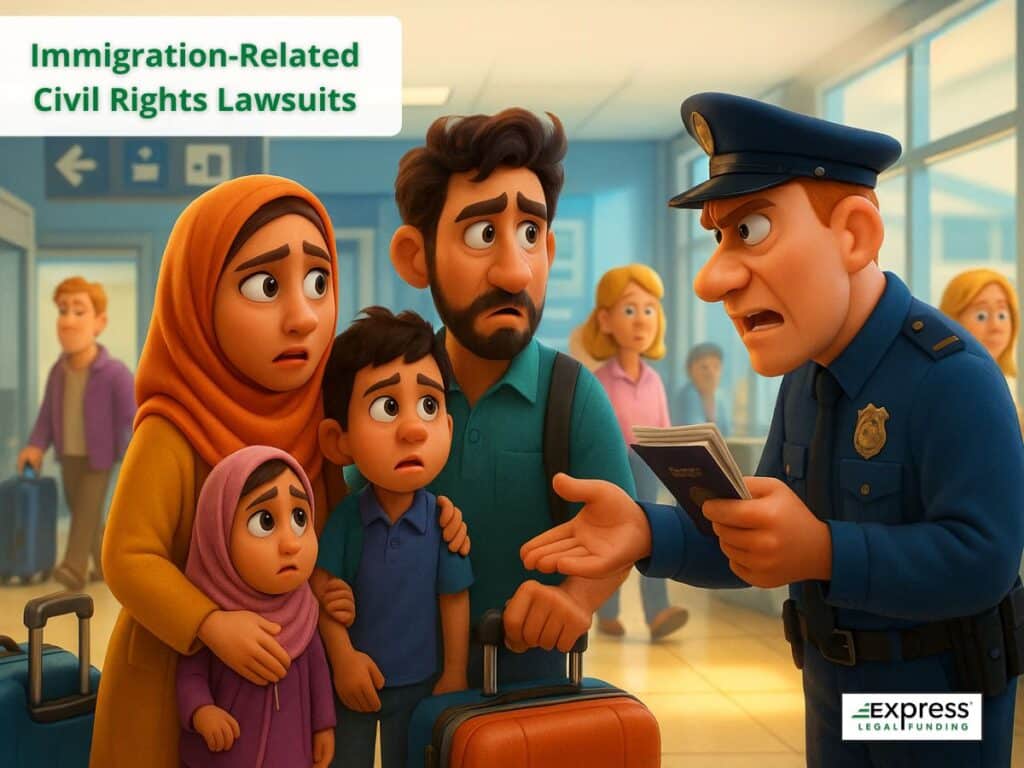
If you were detained without cause, targeted for enforcement based on your ethnicity, or denied public benefits you’re legally entitled to, your rights under the Constitution and federal statutes may have been violated. Claims may be brought under the Equal Protection Clause, Bivens actions against federal officers, or the Federal Tort Claims Act.
Common Examples:
- Targeting enforcement based on ethnicity or language
- Detaining lawful permanent residents without legal justification
- Denying lawfully available public benefits
Defenses you should know: The government may argue sovereign immunity, qualified immunity, or broad congressional power over immigration.
Remedies: Courts may award damages for unlawful detention, stop discriminatory enforcement, or grant attorney’s fees under certain statutes.
Procedural notes: These claims often require navigating special procedures (like the Federal Tort Claims Act) and overcoming federal immunity defenses.
State-Specific Immigration-Related Civil Rights Protections
- Arizona: Known for SB 1070, a law that sparked litigation over racial profiling in immigration enforcement. Courts struck down several provisions but left others intact.
- California: Implements “sanctuary state” laws that limit cooperation with federal immigration enforcement and allow civil remedies when local officials violate those rules.
- Illinois: Passed the TRUST Act, restricting local law enforcement from detaining individuals solely on federal immigration detainers without a judicial warrant.
Statute of Limitations for Civil Rights Lawsuits by Claim Type
| Type of Claim | Typical Federal Deadline | State Variations |
|---|---|---|
| Employment Discrimination | 180–300 days (EEOC) | Longer or shorter possible |
| Police Misconduct | 2–3 years (state PI limits) | Some as short as 1 year |
| Housing Discrimination | 1 year (HUD) | May be extended |
| Prisoner Rights Claims | Varies | Must exhaust grievances first |
Conclusion: Your Next Steps in a Civil Rights Lawsuit
Civil rights lawsuits exist to hold wrongdoers accountable and ensure others don’t experience the same harm. Whether your rights were violated by police, an employer, a landlord, or another authority, the law gives you tools to fight back.
If you think you’ve been wronged, take steps now: document everything, preserve evidence, and speak with an experienced civil rights attorney as soon as possible. These cases can be challenging, but with the right legal support, you can pursue justice and protect your future.
Civil rights cases often take time — sometimes years. While the law works toward accountability, day-to-day financial pressures can mount. That’s where Express Legal Funding can help. We provide pre-settlement funding, also called lawsuit loans, to plaintiffs in civil rights and other lawsuits, so you don’t have to choose between pursuing justice and paying your bills.
FAQs About Civil Rights Lawsuits

Who is the ‘Plaintiff’ in a Civil Rights Lawsuit?
In a civil rights lawsuit, the plaintiff is the person or group who claims their legal rights have been violated and is bringing the case to court. The plaintiff is the one filing the lawsuit — whether that’s an individual, multiple individuals, or sometimes an organization acting on behalf of its members.
To win, the plaintiff must present evidence showing that the defendant (the party being sued) engaged in conduct that violated protections under the U.S. Constitution, federal laws like the Civil Rights Act or Americans with Disabilities Act, or relevant state laws.
Can you sue for emotional distress in a civil rights lawsuit?
Yes. In many civil rights cases, you can seek compensation for emotional distress if you can show the violation caused significant mental or psychological harm. Courts often look for medical records, therapy notes, or testimony to support your claim. Some statutes allow both compensatory and punitive damages.
How much can you win in damages from a civil rights lawsuit?
It depends on the statute and facts of the case. Some civil rights laws, like Title VII, have caps on damages that range from $50,000 to $300,000 depending on employer size. Others, such as § 1983 lawsuits, may allow punitive damages without strict caps. State law can also expand or limit recovery.
Do you need an attorney for a civil rights lawsuit?
Yes. Civil rights cases involve complex laws, strict filing deadlines, and defenses like qualified immunity. An attorney can help investigate, file agency complaints, and litigate effectively against experienced defense counsel. Without legal representation, it’s easy to miss procedural steps that can cost you the case.
What evidence do you need for a civil rights lawsuit?
To succeed in a civil rights lawsuit, you generally need evidence that shows your rights were violated and who caused the harm. This can include witness statements, police or employment records, photos, videos, medical records, or emails. The stronger and more direct your evidence, the better your chances of proving your claim.
What is the statute of limitations for a civil rights lawsuit?
The statute of limitations for a civil rights lawsuit depends on the type of claim and the state where it’s filed. For example, most § 1983 claims borrow the state’s personal injury deadline, usually two to three years. Employment discrimination cases often require filing with the EEOC within 180–300 days.
Some states have shorter deadlines for claims against government agencies, so acting quickly is essential.
Can you sue a private business for civil rights violations?
Yes, but it depends on the situation. Many federal and state laws, like Title II of the Civil Rights Act and the Americans with Disabilities Act, prohibit discrimination in businesses open to the public. You can sue a private business if it denies service, discriminates based on a protected trait, or violates accessibility rules.
Is there free legal help for civil rights claims?
Yes. Groups like the ACLU, NAACP Legal Defense Fund, and local legal aid often assist with civil rights claims. Eligibility usually depends on your income and the type of violation. Some state bar associations also provide pro bono referral programs. Applying quickly is important because these resources are in high demand.



